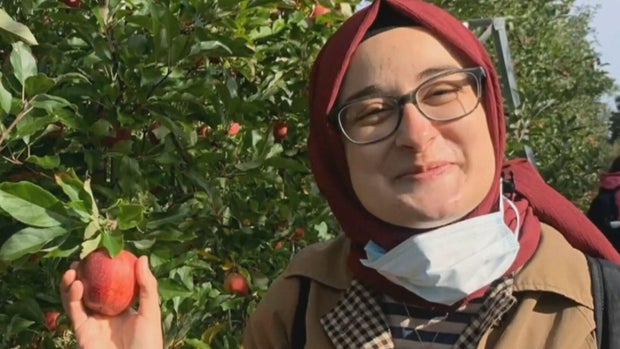Washington — A federal appellate panel on Tuesday is considering high-profile cases involving two international students who were detained by federal immigration officials and now face removal from the U.S. after they made statements that were critical of Israel.
The panel of three judges on the U.S. Court of Appeals for the 2nd Circuit is hearing arguments in emergency appeals from the Trump administration after two federal judges issued separate decisions in favor of Rumeysa Ozturk, a Turkish doctoral candidate at Tufts University, and Mohsen Mahdawi, a Palestinian student at Columbia University, last month.
Administration officials are asking the 2nd Circuit to pause the lower court orders issued in Ozturk and Mahdawi’s cases while their challenges to their respective detentions move forward. In Ozturk’s case, U.S. District Judge William Sessions issued an order for Ozturk, who is being detained at a facility in Louisiana, to be transferred to Immigration and Customs Enforcement custody in Vermont and set a bail hearing for her to attend in person on May 9.
U.S. District Judge Geoffrey Crawford ordered Mahdawi‘s release from immigration custody while the challenge to his detention proceeds.
Appeals court Judges Barrington Parker, Susan Carney and Alison Nathan will consider the administration’s request for a stay of the two orders.
The cases are still in their early stages, and the lower court judges, Sessions and Crawford, are still weighing Ozturk and Mahdawi’s respective habeas corpus challenges to their confinement.
Ozturk, a Ph.D. student at Tufts, was arrested by federal immigration officials near her Somerville, Massachusetts, apartment on March 25, after the Trump administration revoked her student visa. She was not notified of the revocation before her arrest, according to court records.
Secretary of State Marco Rubio said in March that at least 300 students studying at American universities have had their visas rescinded after they were accused of expressing support for Palestinians or participating in campus protests.
Ozturk co-authored an editorial in the Tufts’ student newspaper that criticized the school for its dismissal of several resolutions adopted by the undergraduate student senate as a “sincere effort to hold Israel accountable for clear violations of international law.” The editorial did not mention Hamas.
According to court filings, a memorandum from a senior official with the State Department’s Bureau of Consular Affairs said Ozturk’s visa was revoked based on a request from ICE and the Department of Homeland Security, which determined that she “had been involved in associations that ‘may undermine U.S. foreign policy by creating a hostile environment for Jewish students and indicating support for a designated terrorist organization.'”
After she was arrested, Ozturk was transported to Methuen, Massachusetts, and transported to Lebanon, New Hampshire, followed by St. Albans, Vermont, where she was kept overnight. On the morning of March 26, in Burlington, Vermont, Ozturk was put on a plane and flown to Louisiana, where she is currently in custody at an immigration facility in Basile.
Ozturk’s lawyers filed a petition challenging her arrest and detention as a violation of the First and Fifth Amendments in federal district court in Massachusetts. But the case was transferred to Sessions’ court in Vermont after it was determined that Ozturk was detained in that state at the time the petition was filed.
The Justice Department sought to dismiss Ozturk’s petition while her lawyers asked Sessions to order her to be released or transferred to Vermont while her claims are adjudicated.
Sessions last month ruled that Ozturk’s arrest and detention raised “significant constitutional concerns” and said she must be transferred to ICE custody in Vermont by May 1. He also set a bail hearing for May 9, with Ozturk appearing in person, and will consider the merits of her habeas petition on May 22.
The 2nd Circuit temporarily paused Sessions’ order late last month while it considers the Trump administration’s request for emergency relief.
Mahdawi, who is to graduate from Columbia this month with a bachelor’s degree in philosophy, was detained by immigration agents in Vermont last month during what he was told was his citizenship interview.
He was born in the Israeli-occupied West Bank and he has held a green card for the last 10 years and co-founded his university’s Palestinian Student Union, alongside Mahmoud Khalil, a Palestinian activist, Columbia Ph.D. student and U.S. resident detained by the government. Mahdawi’s attorneys said he took a “step back” from the high-profile protests at the school before students began occupying university buildings.
Khalil, a Palestinian born in Syria, was a vocal member of last year’s protests at Columbia. He was arrested by ICE in March. He is also challenging his removal and detention, though an immigration judge allowed the government to proceed with its effort to deport Khalil.
In an interview with CBS News the day before his arrest, Mahdawi called the interview a “honey trap” that allowed federal immigration officials to detain him while he went in to pursue U.S. citizenship.
Mahdawi’s attorneys secured a court order that blocked the Trump administration from deporting him or moving him outside of Vermont. Then, last week, Crawford released Mahdawi from federal detention as his immigration proceedings continue and again barred the government from removing him from the state or country.
A U.S. attorney arguing against Mahdawai’s release said that keeping him in detention would be a “constitutionally valid aspect of the deportation process” and argued in court filings that Mahdawi’s “presence and activities” in the U.S. “have serious adverse foreign policy consequences” if he remains here.
The Trump administration has been cracking down on U.S. universities and their students who were involved in pro-Palestinian protests waged after Hamas’ Oct. 7, 2023, terror attack on Israel, which triggered the war in the Gaza Strip.
President Trump signed an executive order in January that ordered his administration to use “all available and appropriate legal tools, to prosecute, remove, or otherwise hold to account the perpetrators of unlawful anti-Semitic harassment and violence.” The White House said that these efforts would include deporting alleged “Hamas sympathizers” and revoking student visas.

